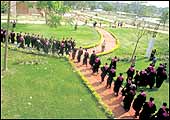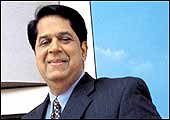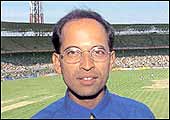|
|
| Global
brand : Dholakia aspires to make
IIMA an Ivy League B-school |
It's
a, it's the best." the delightfully erudite description comes
from a second year student of the Indian Institute of Management,
Ahmedabad's post graduate programme (PGP) in management, described
by Economist magazine as the toughest B-school programme to get
into. It explains why this student, like many others in his batch-it
numbers 150-plus; the first year batch numbers 254; and the batch-size
is estimated to hit 300 next year-chose IIMA despite receiving offers
from all the alphabets in the growing IIM-family, B, C, L, I, and
K. It also explains why the bottom 20 per cent of the class at the
school, a parameter usually ignored by fact-oriented researchers
and perception-oriented journos engaged in ranking B-schools, is,
arguably, far superior to the bottom 20 per cent at the other IIMs.
Empirical evidence supports this claim: In a simple experiment,
several people this writer spoke to picked far more 'losers' they
know (and know of) from the other IIMs than from IIMA. "The
students and the teachers here are far more motivated than those
back home, or anywhere in Europe," gushes Kasper Knokgaard,
an exchange-student from the Copenhagen Business School.
Recruiters-at least some of them-agree that
there is that 'something' about students from IIMA. Adil Malia,
the hr manager of Coca-Cola India, is one such (although he has
a soft spot for XLRI, Jamshedpur too). "The success rate of
students we hire from IIMA is very high," he says. "That's
why we will continue to hire from it.'' Prem Kamath, the head of
management resources at Hindustan Lever Limited, is a bit more circumspect,
strange, given that he is an alumnus of the school. "We do
not have any bias towards IIMA," he says. "We try and
maintain as diverse a management pool as possible." However,
he admits that IIMA has amongst the most stringent admission criteria
in the country.
It must be modesty that makes Jerry Rao, CEO
of Mphasis, to declaim that he'd like to believe that there is nothing
special about students from IIMA. After all, Rao is an alumnus of
the school, and served as the head of Citibank's Indian operations
before deciding that his heart really lay in technology. "Then,
"he says, "empirical data proves otherwise; the guys we
have hired (from IIMA) have been proving their worth.'' Rao, the
guest-of-honour at this year's party for freshers and a role model
for IIMA students daring to walk the entrepreneurial path-"He
had a great job in Citigroup but chucked it all up and started his
own company," says one student, admiration writ large on his
face-pauses. "It is such a good place to learn," he says
softly.
IT'S THE BRAND
IIMB outscores IIMA in terms of association
with key parameters... |
| |
IIM B
|
IIMA
|
| Reputation |
91
|
90
|
| Placement |
91
|
89
|
| Quality of
placement |
92
|
90
|
| Infrastructure |
82
|
82
|
| Faculty |
88
|
87
|
| Teaching |
85
|
84
|
| Specialisation |
64
|
64
|
| Admission Eligibility |
38
|
39
|
|
Figures are proportion of respondents of the
BT survey who associate the schools with these parameters
|
| ... But in terms
of brand equity index, across respondents, IIMA tops |
| |
IIMA
|
IIMB
|
| All |
6.36
|
3.1
|
| Current MBAs |
6.338
|
2.938
|
| MBA Aspirants |
6.853
|
3.305
|
| HR Heads |
5.742
|
3.575
|
| Young Executives |
6.903
|
2.654
|
| Functional
Heads |
5.883
|
3.238
|
| Figures are brand
equity scores |
Rao is also part of the school's recently founded
Alumni Council. With members such as Ashok Alexander, a McKinsey
vet who heads the Bill and Melinda Gates Foundation in India, HLL
Chairman M.S. Banga, ICICI Bank CEO K.V. Kamath, and Tata Industries'
head Kishore Chaukar, the council is a veritable who's who of corporate
India. And Infosys Chairman and Chief Mentor Narayana Murthy, a
former employee of the school-he sort of started its computer department-is
iima's chairman. The school's current director, Bakul Dholakia,
proposes to tap the advice and seek the assistance of the council
and the chairman in his efforts to make IIMA an "Ivy League"
business school. "We have the product," he says. "And
we have the brand (as the BT-ACNielsen ORG-MARG survey would verify);
now, we have to spread the message."
Even without trying to proselytise, IIMA has
a distinctly international feel to it. Like a few other schools
in India, most notably IIMB, it has a vibrant exchange programme
with schools from all over the world (Chicago's Graduate School
of Business; New York University's Stern School of Business; St.
Gallen Graduate School of Business, Switzerland; Copenhagen Business
School; and Australian Graduate School of Management, Sydney). Every
year, 50 students from IIMA spend a term abroad, and 30, from these
European and Asian schools, at Ahmedabad. Still, none of these,
not the quality of its students, not the exchange programme, not
even the marquee alumni, can explain why IIMA emerges as the only
"monopoly" brand in India's crowded B-school firmament
according to the BT-ACNielsen ORG-MARG survey.
THE MAKING OF A BRAND
Could the faculty, as others visiting the subject
before this writer have argued, be the key to IIMA's supremacy?
Dholakia is a specialist in economic growth and planning, who, a
joke among the faculty goes, will be best remembered for allowing
Harsha Bhogle to skip an exam to commentate in a cricket match,
thereby playing a part in the man's rise as one of the world's best
known cricket commentators. His obsession-of-the-moment has to do
with acquiring talent. "We have 75 full-time professors,"
he says. "With some retirements due over the next few years,
we need around 30-35 new teachers." There are resumes aplenty
on Dholakia's database, but the man who joined IIMA in 1979 is committed
to quality, not quantity. "It is not enough to be a good teacher;
you have to be a committed researcher and an able administrator."
The combination, he candidly admits, is not very common in one individual.
|
|
 |
|
IIMA:
#1 and how
|
IIMC:
#3, but the oldest
|
|
Recruiters and MBA aspirants don't even
have to think twice about it: IIM-A is their #1 choice
|
Money is one constraint. In 2002-03, faculty-salaries
at IIMA ranged from (approximately) Rs 2.5 lakh (a year) for an
assistant professor to Rs 5 lakh for a professor; this, when the
average entry-level salary of the class of 2003 was Rs 6.2 lakh
per annum. "Why should anyone be interested?" argues Pankaj
Chandra, the Chair of the school's fpm (fellowship programme in
management). Most professors buttress their salaries with income
from consulting. The school has the money; its faculty members,
even fellows, frequently travel abroad to attend seminars and conferences
and it is in the midst of its biggest expansion drive since 1974
(this will cost Rs 50 crore and explains the hectic activity on
a 39-acre lot adjoining the 65-acre campus), but India's Ministry
of Human Resources- the IIMs fall under its purview-is loath to
change pay scales for professors. That could explain why, when this
writer posed a question to students and professors on the one thing
they would like to see change at IIMA-A wag in the crowd answered
that he would like more natural light in his room; an architectural
quirk makes this well nigh impossible-most people replied "more
autonomy".
Dholakia can't offer monetary benefits; what
he can, though, is a culture of excellence that is the natural result
of hiring only the best instructors. "Why would I want to go
anywhere," asks Rekha Jain, a professor of computing and information
systems, and chair of the placement committee. "I love this
place and my colleagues have kept pushing me to realise my own potential."
Then, there's the culture of egality and freedom. Everyone, assistant
professors, associate professors, full professors, is designated
professor, and the school has rotating chairs in various areas;
even junior professors can hold these chairs. Abraham Koshy, a professor
of marketing at the school-he has been at IIMA for over 15 years
and is a legend in his own right-says he will never trade the "freedom
this institute gives me for anything; it is part of what makes this
place great".
|
|
 |
|
M.S.
Bagga, Chairman, HLL
|
K.V.
Kamath, CEO, ICICI Bank
|
|
|
 |
|
Jerry
Rao, CEO, Mphasis
|
Harsha
Bhogle, Commentator
|
|
Don't discount the old-boy factor. IIMA
boasts alumni such as Banga, Kamath, and Rao. Why, even ace
cricket commentator Harsha Bhogle is an alumnus of the school
|
The school is also keen that it doesn't lose
the research-edge. "Good research is important," says
Jayant Verma, the chair of research and projects. "It keeps
you on your toes and helps you command the respect of peers and
students." IIMA publishes a report at the end of each year,
detailing exactly how much research each professor has done.
Still, it is unlikely that faculty (or the
quality of it) is the school's differentiator. The directors of
the schools ranked second and third in the BT-ACNielsen ORG-MARG
survey, IIMB and IIMC, Prakash Apte and Shekhar Chaudhuri respectively,
are alumni of IIMA. And in the mid-1990s, under the stewardship
of then director K.R.S. Murthy, IIMB embarked on a drive to hire
faculty that would, even by today's standards, be termed ambitious.
The real reason for IIMA's pre-eminence is
a mix of everything- the alumni, the students, the faculty-plus
one other critical ingredient, the school's case study method of
instruction. This isn't unique to IIMA, but "the range, depth,
and intensity with which we deal with the subject, and the fact
that these cases are real-life, makes them unique", says Dholakia.
Adds Samir K. Barua, the PGP-chair, "We facilitate comprehensive
discussions and students have to participate." The quality
of the discussion, given that of the students, is high and it may,
over a period of time, well play a part in honing the skills of
instructors. That, says an IIMC alumnus, could explain why IIMA
seems to have mastered the art of "teaching its students to
think". Can other schools replicate this? Logic suggests they
should be able to, but then, some brands derive their strength from
being context-specific.
|
